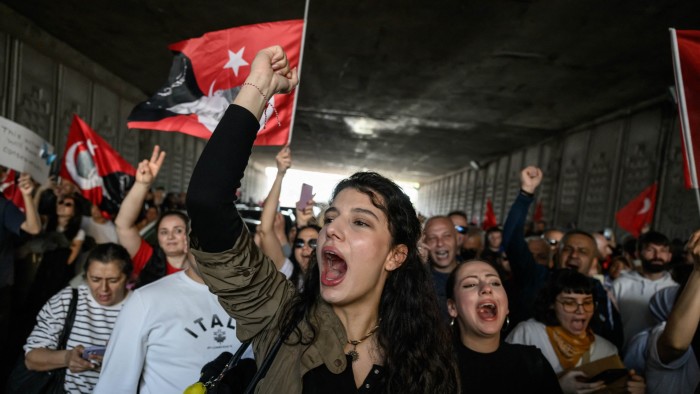Stay informed with free updates
Simply sign up to the Life & Arts myFT Digest — delivered directly to your inbox.
Humour is no laughing matter in Turkey, it is a mechanism for coping with stress and suppression. It carries a deep well of melancholy. One of our running jokes these days goes like this: a journalist behind bars asks the prison guards if he might have some books to read and enquires about a particular novel. “No, we don’t have that novel,” comes the reply. “But we do have the author.”
Turkey has long been one of the world’s worst jailers of media professionals, academics and human rights activists — it ranks 165th among 180 countries in the Reporters Without Borders World Press Freedom Index (2023). It has one of the highest prison populations in Europe. But now, put under lock and key, is Ekrem İmamoğlu, the charismatic and much-loved mayor of Istanbul. İmamoğlu is no ordinary politician. He is hugely popular and the biggest rival to president Recep Tayyip Erdoğan’s regime. This is the reason why, in a shocking turn of events, his university degree was revoked and he was arrested just as he was about to announce his presidential nomination. On the day his party, the Republican People’s party (CHP) officially declared him the presidential nominee, he was sent to the high-security Silivri prison.
Millions of people, both in Turkey and across the diaspora, are shocked and angry in the face of this blatant injustice and clampdown on the political opposition. Protests have erupted across the country, with massive rallies taking place in at least 55 of the 81 provinces, despite the government’s concerted attempts to outlaw them. The fact that demonstrations are happening on such a wide scale in a country where media freedom is destroyed, and where almost all TV channels are under strict censorship, is in itself noteworthy. “Law enforcement officials indiscriminately used pepper spray, tear gas, plastic bullets and water cannons against protesters, causing numerous injuries,” reported Human Rights Watch. Almost 1,900 people were arrested, even photojournalists who were covering the events. CHP has called for a nationwide boycott of pro-government companies and media, and more rallies are being planned for the coming weeks.
Women play a crucial role in these protests. In a moving speech, İmamoğlu’s wife Dilek İmamoğlu addressed the crowds, highlighting how “everyone found something of themselves and the injustices they faced in what was done to Ekrem”. Turkish women of all backgrounds know that when a country slides towards autocracy, women’s rights will be among the first losses. Erdoğan’s Justice and Development party (AKP) has withdrawn from the Istanbul Convention, an international treaty protecting victims of domestic violence. This in a country where femicides and violence against women have been on the rise.
But it is the Turkish youth who have been at the forefront of the protests. This is a new generation that wants to live in dignity, freedom and democracy. They want change. They are also brilliantly creative. The video of a Pikachu-costumed protester escaping from riot police went viral across the world. Another striking image was a protester wearing a gas mask and a whirling dervish robe, spinning slowly and calmly as he was engulfed with pepper spray. A photograph of a female student sitting in front of police tanks reading Jean-Jacques Rousseau’s The Social Contract reminded us that “Every man having been born free and master of himself, no one else may under any pretext whatever subject him without his consent”.
In a country that has been ravaged by financial instability, rampant inflation, a depreciating currency, high youth unemployment and increasing authoritarianism, İmamoğlu symbolised change and hope. On his campaign trail, his slogan has always been sanguine: “Everything will be beautiful.” It was a young student, Berkay Gezgin, who coined this optimistic slogan. Now he, too, has been arrested. Anyone who speaks up today is taking a risk, and yet it is impossible not to speak up when what little democracy we had is being smashed to pieces.
Among those who were arrested with İmamoğlu was the deputy secretary-general Mahir Polat, a well-known and respected art historian. Holding a doctoral degree in cultural heritage, he launched the Istanbul Metropolitan Municipality (IBB) Heritage Unit, helped restore historical buildings and invested in free and inclusive public spaces, libraries and art centres, as well as in cultural preservation and artistic creativity. We should have thanked him for his dedication to culture and art. Instead he is incarcerated.
This feels like a breaking point. For so many years, Turkey had been going backwards, its democratic institutions and norms severely damaged. But we had a ballot box, and holding elections mattered — the voter turnout being near the top among OECD countries. But now the ballot box, too, is in danger, as the most popular rival to the regime has been unjustly imprisoned. Turkey needs and deserves democracy. Not authoritarianism.
Resilient humour and sorrow go hand in hand. We do not forget our motherlands just because we happen to be miles and continents away; we carry them with us wherever we go. They emerge in our silences. They seep into our dreams.
Elif Shafak is a novelist; her most recent novel is ‘There Are Rivers in the Sky’
Find out about our latest stories first — follow FT Weekend on Instagram and X, and sign up to receive the FT Weekend newsletter every Saturday morning
